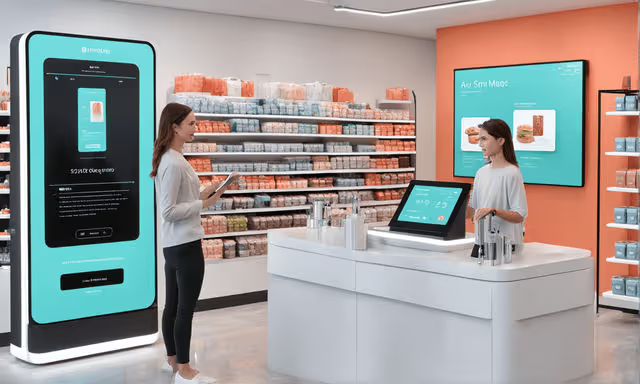How to Use AI for Retail Success: 6 Tips from Industry Experts
I recently visited a retail store. The shelves were well stocked, the displays were eye-catching, and the offers were enticing. And this got me thinking – how many of these decisions will be made by humans in the years to come?
Retailers handle countless tasks, from inventory management to customer service. While some require a human touch, others are primed for AI. But the key is knowing when and how to leverage AI effectively.
In this post, based on Alex Dean’s (Co-founder and CEO, Snowplow) insightful conversation with Mark Pinkerton and David Worby of Prospero on S3E5 of the Multichannel Success Podcast, we’ll delve into the importance of AI in retail, explore how retailers can harness its power for success, and provide practical tips for those embarking on their AI journey.
What Does AI in Retail Look Like & Why Does it Matter?
AI is on the cusp of completely transforming the retail landscape.
At its core, AI refers to the ability of machines to perform tasks that typically require human intelligence, such as learning, problem-solving, and decision-making.
As Alex Dean explains on the podcast, “In the AI world, we’re using large data sets, including data sets from our own organizations, to train models. So no one has to write any code, but we have models that are trained on our data, and we can then give them a new scenario, a new piece of data, and then make a decision based on that.”
The retail industry is no stranger to data. But the sheer volume and complexity of information generated today can be overwhelming. This is where AI shines. By leveraging AI, retailers can process vast amounts of data, identify patterns, and make accurate predictions at a scale that simply would not be possible for humans. (According to a study by Incisiv, a typical retailer generates around 1.4 petabytes of data per billion dollars in revenue. For large retailers with billions in revenue, the data generated can easily reach tens or hundreds of petabytes!)

One of the areas we’re starting to see AI have a profound impact on is personalization.
As Mark Pinkerton from Prospero points out, “AI has definitely taken the lead in that space.”
By analyzing large amounts of customer data, AI algorithms can create highly personalized experiences, tailoring product recommendations, promotions, and content to individual preferences. This level of personalization not only enhances customer satisfaction but it also drives sales and loyalty. In fact, a study by McKinsey found that companies earned 40% more revenue from personalization efforts, and consumers are 40% more likely to spend more than planned when experiences are highly personalized.
Another crucial aspect of AI in retail is its ability to optimize operations and streamline processes. From demand forecasting and inventory management to supply chain optimization, AI can help retailers make data-driven decisions that improve efficiency and reduce costs.
As Alex notes, “The behavioral signal that we’re capturing off websites, mobile apps etc. is highly, highly predictive. And so when we feed that data into AI models, we get really interesting outputs.”
There are already plenty of examples of retailers taking advantage of this, such as a leading fashion retailer who improved their forecasting accuracy significantly by implementing an AI system, leading to better inventory management and cost savings.
But despite the numerous benefits of AI, many retailers are still grappling with how to effectively implement and integrate it into their operations. As Mark observes, “I still don’t think very many have got to the level of digital data maturity that enables them to really engage with AI.” This is where a strategic approach and collaboration with AI experts becomes critical.
Here, we break down the steps Alex, Mark, and David share on the podcast.
How to Implement AI in Your Retail Business
1. Identify Use Cases
Focus on areas where AI can have the biggest impact on your retail business, such as personalization, demand forecasting, or inventory management.
2. Assess Your Data Readiness
AI relies on clean, structured, and abundant data.
Evaluate the quality and quantity of your data assets, identify gaps, and develop a plan to collect, clean, and integrate the necessary information.
3. Build a Data Platform
Invest in robust, scalable data infrastructure to help you handle the volume and complexity of data required for AI applications.
4. Collaborate with AI Experts
Partner with AI specialists, agencies, or service providers who can guide you through the implementation process and help you avoid the common pitfalls.
5. Start Small and Scale
Begin with pilot projects to validate the effectiveness of AI in your specific use cases. Once you’ve demonstrated success and gained confidence, gradually expand AI across your organization.
6. Continuously Monitor and Optimize
Regularly assess the performance of your AI models, gather feedback from stakeholders, and make necessary adjustments to ensure ongoing success.

3 Tips for Retailers Embarking on Their AI Journey
On the podcast, Alex shares his top 3 tips for retailers starting out on their AI journey:
1. Educate Yourself and Your Team
Encourage your team to explore AI technologies and their potential applications in retail. Platforms like ChatGPT and Midjourney offer accessible ways to experiment with the technology.
2. Focus on Rich Historical Data
Identify areas within your business where you have extensive historical data, such as customer behavioral data across your digital estate or supply chain operations. These data sets can serve as a solid foundation for AI applications.
3. Embrace a “Crawl, Walk, Run Approach”
Understand that AI adoption is a gradual process. Start with small, manageable projects and progressively expand as you gain confidence and experience.
Closing Thoughts
What’s clear from the podcast discussion is that AI is no longer a futuristic, nebulous concept. It’s become a necessary tool for success.
As Alex, Mark, and David emphasize throughout the episode, embracing AI is essential for retailers looking to remain competitive, efficient, and customer-centric.
By understanding the importance of AI in retail, identifying key use cases, assessing your data readiness, collaborating with experts, and adopting a gradual implementation approach, your retail business can start reaping the rewards AI provides. The journey may be challenging at times, but the benefits – increased efficiency, hyper-personalization, and data-driven decision making – are all well worth the effort.
The key is to remember that every step forward, no matter how small, brings you closer to unlocking the full potential of your retail business. Stay curious, stay committed, and keep learning. And soon, you’ll be well on your way to thriving in the AI-powered retail revolution.
Ready to Revolutionize Your Retail Business with AI?
Take the first step today by listening to Alex Dean, Mark Pinkerton, and David Worby’s eye-opening discussion on S3E5 of the Multichannel Success Podcast.
Ready to get started with AI? Then contact us to see how Snowplow’s Next Generation Customer Data Infrastructure can help you unlock the AI use cases that will transform your business.

